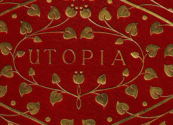The Political and Existentialist Dimensions of Utopian Discourse during the Enlightenment
by Aramis Miranda-Reyes
From the beginning of our course there have been three particular aspects of Utopian discourse at play in our readings which have fascinated me. First there is the political, second is the existentialist as it relates to the metaphysical and finally, there is the philosophical as it relates to the historical. The interplay between these expansive sections of Enlightenment “human sciences” as Hans-Georg Gadamer refers to them in his seminal work Truth and Method, are I believe the foundation of a type of literary discourse which not only satirized and criticized but also analyzed, prescribed and historicized in ways that are unique to this period in history. My proposed examination of this interplay of “human sciences” will flow along the following lines: Political reality leading to author perception, conversation and understanding in the existentialist sense which then leads to authorship in the literary sense. In essence, and just as Maurice Merlau-Ponty describes in The Primacy of Perception, Enlightenment authors like Swift (Gulliver’s Travels) and Voltaire (Candide) used social and economic realities influencing them to perceive and express their intentions in the world based on the humoral infrastructure (as secret affective moments) of their individual selves. Consequently Enlightenment Utopian literature, as we will see specifically expressed by the aforementioned authors, can be seen and understood as a dialogue or conversation between the external (socio-political) and the internal (deeply personal) of human existence.
The examination of this “alternative cognitive comportment” during the Enlightenment as Lawrence E. Klein refers to it in his book What’s Left of Enlightenment? – A Postmodern Question, will be firmly rooted in the theoretical works of Gadamer (Truth and Method, Reason in the Age of Science), Merlau-Ponty (The Primacy of Perception), Sullivan (Political Hermeneutics), John Locke (The Two Treatises of Government), Hobbes (Leviathan), and the Third Earl of Shaftesbury’s Sensus Communis (1709). Sensus Communis in particular is a central concept which deeply affects the writings of all these theorists and authors thereby expanding their frame of reference beyond the more typical scientific and oppressive concerns which are consistently attributed to the Enlightenment. In many ways it is the tie that binds their philosophical conceptions and informs the literature of Swift and Voltaire to a great extent. But what specifically is sensus comunis? For his definition, Gadamer relies on the 1708 oration of Humanist Gianbattista Vico titled “De Nostri Temporis Studiorum Ratione”, in which he states “what gives the human will its direction is not the abstract universality of reason but the concrete universality represented by the community of a group, a people, a nation, or the whole human race. Hence developing this communal sense is of decisive importance for living.” In simple terms, Intersubjectivity. Intersubjectivity in its most generic sense is defined by British Sociologist Professor Clive Seale as the “shared meanings constructed by people in their interactions with each other and used as an everyday resource to interpret the meaning of elements of social and cultural life. If people share common sense, then they share a definition of the situation.”
Hence, from this informed perspective, we will examine certain scenes and aspects of Gulliver’s Travels (ex. encounters with the Yahoos and Houyhnhnms) and Candide (ex. Chapter XXVIII where Candide talks with Pangloss ) to come up with an expression of the Enlightenment as conversation which reveals the intellectual landscape of the time in terms of human nature. Other invaluable sources identified so far relating to this topic are: Enlightenment Contested by Jonathan I. Israel, Locke, Shaftesbury and Hutcheson by Daniel Carey and Reclaiming the Enlightenment by Stephen Eric Bronner.



Looking good–can you zero in on this:
“different individuals in different situations, inhabiting different geo-political spaces (like Swift and Voltaire) produced different perspectives on reality using their individual perception…”
Narrow down the focus of these sentences, and you will be ready to go…
The core of the investigation is as follows: If we are to go beyond the dialectic of totalitarian oppression as expressed by Horkheimer and Adorno and reclaim the true spirit of the Enlightenment as a radical experiment in social and political reform, we also have to acknowledge it as a conversation in which different individuals in different situations, inhabiting different geo-political spaces (like Swift and Voltaire) produced different perspectives on reality using their individual perceptions, their common sense (sensus communis) and the shared discourse and philosophical meanings of other intellectuals with similar intent.
Very rich–but still too broad at the moment. Before class, see if you can summarize the core of the argument/ investigation in a single sentence and we can work from there. Looking forward to discussing!